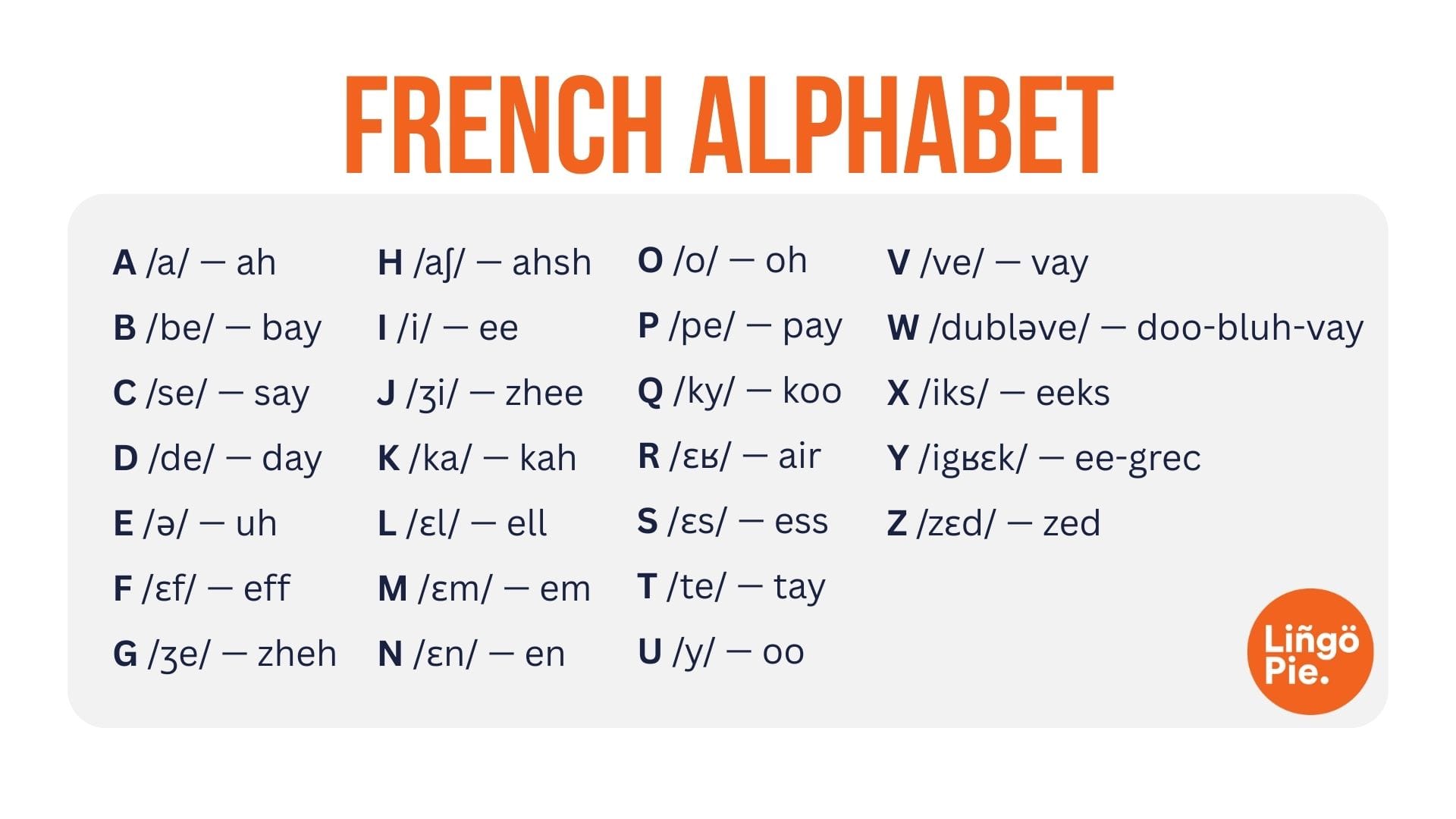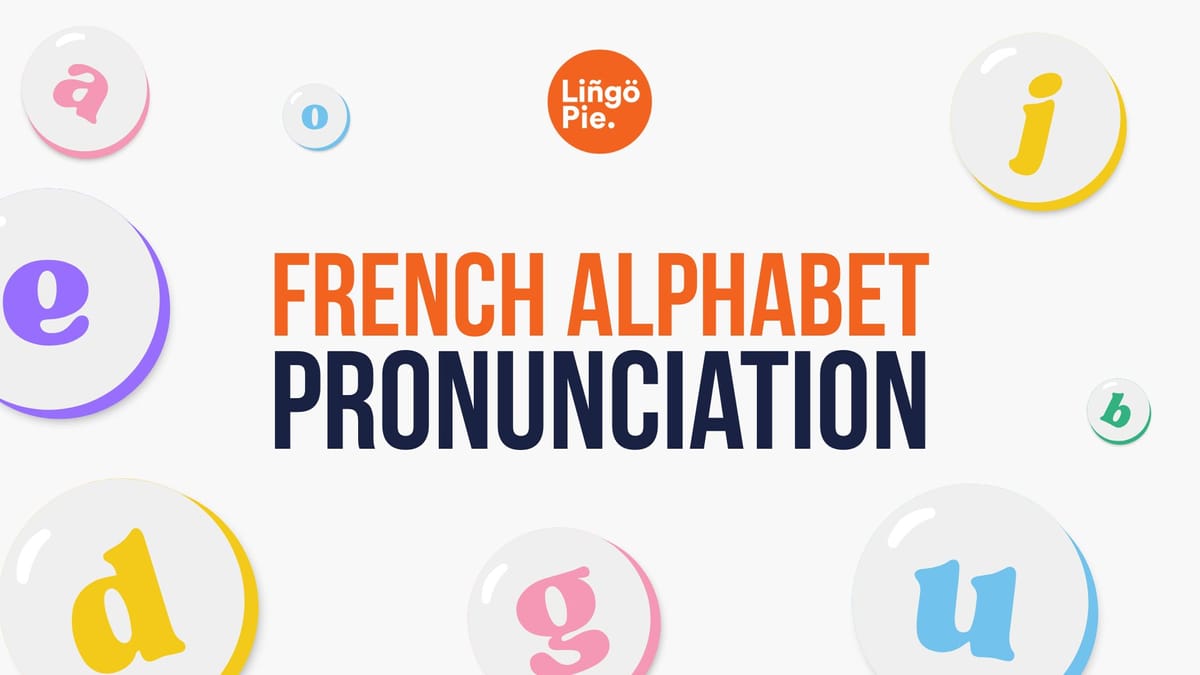Learning French often starts with picking up common phrases like "bonjour" and "merci," or maybe even memorizing the lyrics to "La Vie en Rose." While these are great first steps, something far more fundamental can transform your French: mastering how the French alphabet actually sounds.
The truth is that improving your French pronunciation is a must because many of the words in this language are pronounced quite differently from what you’d expect based on their spelling. In fact, French has silent letters, nasal sounds, and vowel combinations that can completely change meaning if mispronounced!
In this guide, I'll explain everything you need to know about French alphabet pronunciation, answer the most common questions learners have, and share my personal approach to mastering French sounds using tools like Lingopie. Let’s begin!
- 7 Best Apps To Learn French For Free
- 13 Must-Know French Traditions For Your Next Trip
- Best Way to Learn French on Your Own [Guide]

How Many Letters Are In The French Alphabet?
Just like in English, the French alphabet contains exactly 26 letters. Many beginners get confused when they see letters with accent marks like é, è, or ç and assume these are additional letters. However, they’re actually diacritical marks that modify how existing letters sound.
While French uses the same 26 letters as English (6 vowels and 20 consonants), the actual number of distinct sounds, or phonemes, reaches 36 when you factor in accents, letter combinations, and different pronunciations based on placement within words.
Take the letter "a," for example. In l’alphabet français, "a" sounds completely different in "chat" (cat) versus "pâte" (pasta) because of that little circumflex accent. This means that mastering French pronunciation requires understanding not just the letters, but how context and accents transform their sounds entirely.

French Alphabet Pronunciation Guide
French uses the Latin alphabet, which means you’ve already mastered the hardest part—you know every single letter. The only challenge now is simply retraining your mouth and ears to produce and recognize different sounds for letters you've known since childhood.
Personally, I've found that singing the French alphabet in the traditional English tune actually creates confusion because my brain keeps defaulting to English pronunciations. Instead, I prefer the military-style singing where each letter is pronounced clearly and distinctly with deliberate pacing: "Ah... Bé... Eé... Dé..." This method also forces me to focus on the unique French sound of each letter rather than rushing through familiar patterns.
| Letter | Pronunciation | French Word Example |
|---|---|---|
| A | ah | ami (friend) |
| B | bay | bonjour (hello) |
| C | say | chat (cat) |
| D | day | deux (two) |
| E | euh | école (school) |
| F | ef | famille (family) |
| G | zhay | gâteau (cake) |
| H | ahsh | hôtel (hotel) |
| I | ee | ici (here) |
| J | zhee | jardin (garden) |
| K | kah | kilo (kilo) |
| L | el | livre (book) |
| M | em | maison (house) |
| N | en | noir (black) |
| O | oh | orange (orange) |
| P | pay | pain (bread) |
| Q | koo | quand (when) |
| R | air | rouge (red) |
| S | es | soleil (sun) |
| T | tay | table (table) |
| U | oo | université (university) |
| V | vay | voiture (car) |
| W | doo-bluh-vay | wagon (wagon) |
| X | eeks | exemple (example) |
| Y | ee-grek | yaourt (yogurt) |
| Z | zed | zéro (zero) |
How Do You Pronounce Accents In French?
French accent marks are pronunciation guides that tell you exactly how to say each vowel and its intended meaning. For example, "ou" means "or" while "où" means "where," and the only difference is that tiny grave accent.
While they may seem tricky initially, these diacritical marks make French pronunciation more predictable than English once you learn the rules. Here are the main French accent marks and how they affect pronunciation: circumflex, grave, cicumflex, cedilla, and diaeresis.
É (acute accent)
Creates a closed "ay" sound, typically found at the end of words or syllables
- café (coffee) - pronounced "kah-FAY"
- éléphant (elephant) - pronounced "ay-lay-FAHN"
È (grave accent)
Produces an open "eh" sound and can distinguish between similar words
- père (father) - pronounced "pair"
- où (where) vs ou (or) - same sound but different meanings
Ç (cedilla)
Transforms the hard "k" sound of C into a soft "s" sound
- français (French) - pronounced "frahn-SAY"
- leçon (lesson) - pronounced "luh-SOHN"
Ê, Â, Ô (circumflex accent)
Affects vowel pronunciation and often signals historical letter changes
- être (to be) - pronounced "eh-truh"
- pâte (pasta) - pronounced "paht"
Ë, Ï (diaeresis)
Separates vowels that would normally blend together
- Noël (Christmas) - pronounced "no-EL"
- maïs (corn) - pronounced "mah-EES"

Are There Silent Letters In French?
Yes, French has many silent letters, and learning which letters to skip is just as important as knowing which ones to pronounce. Unlike English where silent letters seem random, French silent letters follow predictable patterns that make sense once you understand the rules.
Here are the main silent letter patterns in French:
Final consonants are usually silent
Most words ending in s, t, d, x, g, or p don't pronounce the final letter
- chat (cat) - the "t" is silent, pronounced "shah"
- temps (time) - both "p" and "s" are silent, pronounced "tahn"
The letter H is almost always silent
Unless it's part of "ch", making a "sh" sound
- hôtel (hotel) - pronounced "oh-TEL"
- heure (hour) - pronounced "eur"
Final E is typically silent
Unless it has an accent mark
- table (table) - pronounced "tahbl"
- ville (city) - pronounced "veel"
U after G or Q is silent
But it changes how the G sounds
- guitare (guitar) - the "u" is silent, pronounced "gee-TAHR"
- quand (when) - the "u" is silent, pronounced "kahn"
I after O makes a "wa" sound
The I itself isn't pronounced separately
- moi (me) - pronounced "mwah"
- trois (three) - pronounced "twah"
• N in nasal combinations disappears - Letters like "an," "en," "in" create nasal sounds
- pain (bread) - pronounced "pahn" with a nasal sound
- vent (wind) - pronounced "vahn" with a nasal sound
How Do You Pronounce French Vowels?
Nasal Vowels
Nasal vowels are produced when air flows through both your mouth and nose simultaneously, creating a distinctive "buzzing" quality that doesn't exist in English. These sounds occur when vowels are followed by 'm' or 'n' in certain combinations, and the consonant itself often becomes silent.
- an/en - Creates an "ahn" nasal sound
- blanc (white) - pronounced "blahn"
- temps (time) - pronounced "tahn"
- in/ein/ain - Creates an "ahn" nasal sound (same as an/en in modern French)
- pain (bread) - pronounced "pahn"
- main (hand) - pronounced "mahn"
- on - Creates an "ohn" nasal sound
- bon (good) - pronounced "bohn"
- mon (my) - pronounced "mohn"
- un - Creates an "uhn" nasal sound (mostly in southern France)
- un (one) - pronounced "uhn"
Oral Vowels
Oral vowels are pronounced with air flowing only through your mouth, similar to English vowels but with more precise, unchanging sounds. French has both simple oral vowels and vowel combinations that create consistent sounds.
- a - Always pronounced "ah"
- chat (cat) - pronounced "shah"
- e - Has multiple pronunciations depending on accents
- le (the) - pronounced "luh"
- café (coffee) - pronounced "kah-FAY"
- i - Always pronounced "ee"
- ici (here) - pronounced "ee-SEE"
- o - Can be open "oh" or closed "oh"
- mot (word) - pronounced "moh"
- u - Pronounced "oo" with rounded lips
- tu (you) - pronounced "too"
Semi-Vowels
Semi-vowels, also called glides, are sounds that start like vowels but quickly transition to other sounds within the same syllable. They act as bridges between vowels and consonants, creating smooth transitions in French pronunciation.
- w sound - Appears in "oi" combinations
- moi (me) - pronounced "mwah"
- toi (you) - pronounced "twah"
- y sound - Appears when "i" is followed by another vowel
- pied (foot) - pronounced "pee-YAY"
- bien (well) - pronounced "bee-YAHN"
- ɥ sound - Appears when "u" is followed by another vowel
- lui (him) - pronounced "loo-EE"
- huit (eight) - pronounced "oo-EET"
How To Practice French Pronunciation
The best way to master French pronunciation is through exposure to authentic French speech, and that’s exactly what Lingopie provides through real TV shows and movies. With its immersive approach and advanced features, you can finally develop an ear for authentic French pronunciation while enjoying entertaining content.
Real French Pronunciation Samples

Lingopie exposes you to genuine French pronunciation through popular TV shows and movies, giving you access to different accents, speaking speeds, and conversational styles. You'll hear how French sounds in romantic comedies, thrillers, documentaries, and daily conversations—not just classroom scenarios.
Read Out Loud Feature

When you encounter a new word or phrase, Lingopie's read out loud button automatically pauses the video and provides clear, natural pronunciation. This isn't robotic text-to-speech—it's authentic pronunciation that matches what you just heard in context, helping you connect the written word with its proper sound.
Say It Feature

The "Say It" feature turns your device into a pronunciation coach. Simply speak into your microphone and try to match the native speaker's pronunciation. This interactive practice helps you train your mouth muscles and develop muscle memory for French sounds, giving you immediate feedback on how closely you're matching authentic pronunciation.
Build Custom Flashcards with Context

As you click on words and phrases, Lingopie automatically creates personalized flashcards that include the complete scene context, pronunciation guide, and translation. This means you're not just memorizing isolated words—you’re learning how they sound and function within real conversations, making your pronunciation practice more meaningful and memorable.
Improve Your French With Lingopie
As you can see, learning French alphabet pronunciation doesn’t have to be a tedious memorization exercise filled with boring drills and robotic audio clips. With Lingopie, you can learn French sounds while binge-watching captivating French shows and movies that you’ll actually want to finish.
Whether you’re struggling with those tricky nasal vowels, perfecting your accent marks, or finally nailing that French "R," Lingopie’s interactive features are guaranteed to make pronunciation practice feel less like studying and more like entertainment.
Ready to level up your French pronunciation? Try Lingopie for free today!






![What’s The Best Way To Learn Polish Quickly? [Guide]](/blog/content/images/size/w1200/2025/08/What-s-The-Best-Way-To-Learn-Polish-Quickly.jpg)



